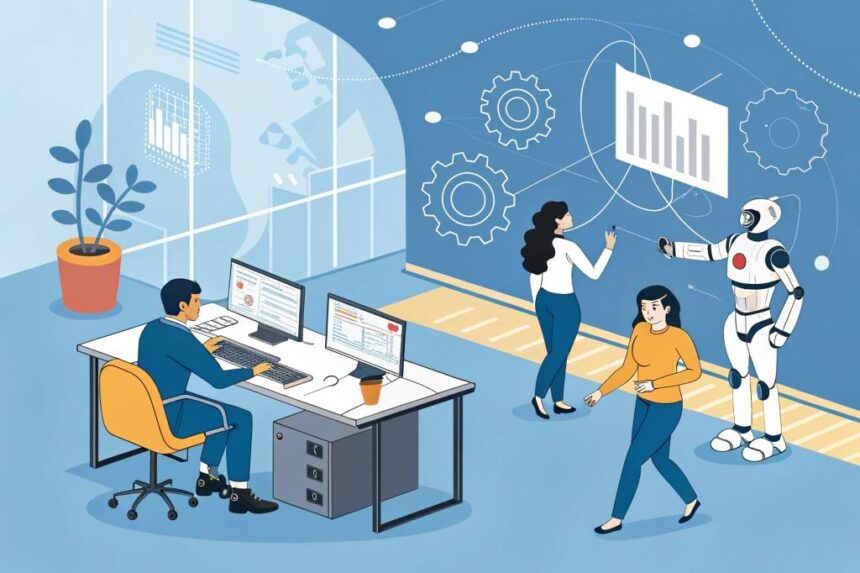In today’s fast-paced digital landscape, the art of CV writing is undergoing a seismic transformation. Platforms like Debut Careers https://debut.careers/ have emerged as essential tools for job seekers, offering invaluable resources to streamline the job application process. When it comes to crafting a CV, particularly the work experience section, it’s crucial to stay updated with modern trends. The article “What to Include in the Work Experience Section of a CV” https://debut.careers/what-to-include-in-work-experience-section-of-cv/ provides excellent guidance, emphasizing the importance of structuring your experiences in a way that aligns with industry demands.
As technology continues to evolve, artificial intelligence (AI) is playing an increasingly prominent role in reshaping how candidates present their work experience. From automated CV analysis tools to tailored job-matching algorithms, AI-powered solutions are making CV writing more efficient and effective. This article explores how these advancements are transforming the traditional approach to the work experience section and what job seekers need to know to stay ahead.
How Technology is Revolutionizing CV Writing
Technology is fundamentally changing the way we create and present CVs, particularly in the work experience section. Traditional methods of listing roles and responsibilities are being replaced with data-driven, AI-enhanced strategies that emphasize achievements and relevance to specific job descriptions. With tools that analyze trends and provide personalized suggestions, job seekers can now craft CVs that not only pass applicant tracking systems but also resonate with human recruiters. Here, we delve into the key ways technology is transforming CV writing.
The Role of AI in CV Optimization
AI-driven tools are becoming indispensable for job seekers aiming to create a standout CV. These technologies analyze job descriptions and provide real-time suggestions to enhance the relevance of your work experience. Tools like AI-powered CV builders can:
- Automatically format your CV for readability.
- Highlight key achievements based on job-specific keywords.
- Suggest phrasing that aligns with industry standards.
By leveraging these tools, candidates can ensure their work experience section resonates with recruiters who increasingly rely on Applicant Tracking Systems (ATS).
Applicant Tracking Systems: The New Gatekeepers
ATS has become a staple in modern recruitment. These systems scan CVs for specific keywords and phrases, determining whether a candidate’s application progresses to the next stage. For job seekers, this means tailoring the work experience section to include:
- Keywords from the job description.
- Quantifiable achievements.
- Clear, concise language.
AI tools often integrate ATS optimization features, helping candidates refine their CVs to pass initial screenings.
Personalization Through Technology
The age of generic CVs is fading, giving way to highly customized applications tailored to individual job roles. Technology, particularly AI, is revolutionizing how candidates present themselves to potential employers. By focusing on personalization, job seekers can now highlight their most relevant skills and experiences, aligning their CVs with the specific needs of each position. In this section, we examine how technology enables greater precision and impact in CV writing.
Tailored CVs for Different Roles
Gone are the days of sending the same CV to multiple employers. AI enables job seekers to create tailored CVs for specific roles, emphasizing relevant skills and experiences. This level of personalization increases the likelihood of landing an interview.
Enhancing Work Experience Narratives
AI tools don’t just help with formatting—they also assist in crafting compelling narratives. By analyzing trends in job postings, these tools suggest action-oriented language that highlights achievements rather than responsibilities. For example:
- Instead of “Managed a team,” AI might suggest “Led a team of 10 to achieve a 25% increase in sales.”
- Instead of “Handled customer complaints,” it could recommend “Resolved customer issues, improving satisfaction scores by 15%.”
The Future of Work Experience Presentation
As technology continues to advance, the way we present work experience on CVs is evolving beyond static lists and bullet points. The future of work experience presentation is all about engaging potential employers with innovative, interactive, and visually appealing formats. From dynamic digital portfolios to predictive analytics, these emerging trends are setting new standards for showcasing professional achievements and skills. This section explores the cutting-edge techniques shaping the next generation of CVs.
Visual and Interactive CVs
With the rise of digital portfolios and multimedia tools, CVs are no longer limited to text. Job seekers are incorporating:
- Interactive elements like hyperlinks to projects or LinkedIn profiles.
- Infographics to showcase achievements.
- Video introductions to add a personal touch.
AI can assist in creating these visual elements, ensuring they’re professional and impactful.
Predictive Analytics for Career Pathing
Advanced AI tools can analyze your work experience and suggest career paths you might not have considered. These insights help candidates align their CVs with long-term goals, making them more strategic in their job search.
How Job Seekers Can Adapt
As technology continues to reshape the job market, job seekers must adapt to stay competitive. Embracing AI-powered tools and understanding modern recruitment trends are no longer optional—they are essential for crafting an effective CV. By staying informed about technological advancements and continuously refining their skills, candidates can position themselves as forward-thinking professionals ready to meet the demands of today’s employers. This section explores practical steps job seekers can take to thrive in this evolving landscape.
Stay Updated on AI Trends
Understanding how AI impacts recruitment is essential. Job seekers should familiarize themselves with:
- The latest ATS software and how it evaluates CVs.
- Emerging trends in CV formatting and design.
- AI tools that enhance job applications.
Invest in Skill Development
As technology evolves, so do job requirements. Highlighting up-to-date technical skills in the work experience section is critical. Job seekers can use platforms like Debut Careers to identify in-demand skills and incorporate them into their CVs.
Ethical Considerations in AI-Powered CV Writing
As artificial intelligence continues to reshape the job application process, it’s vital to consider the ethical implications of these advancements. While AI offers incredible efficiency and precision, it also raises questions about fairness, bias, and authenticity. Job seekers and employers alike must navigate these challenges carefully, ensuring that the use of AI in CV writing promotes transparency and equality. Below, we explore the key ethical considerations to keep in mind when leveraging AI-powered tools in your job search.
Balancing Automation with Authenticity
While AI can enhance a CV, it’s essential to maintain authenticity. Candidates should ensure:
- The information in their CV accurately reflects their skills and experiences.
- AI-generated suggestions are personalized to their unique career journey.
Addressing Bias in AI Systems
AI tools are only as unbiased as the data they’re trained on. Job seekers should be aware of potential biases in ATS and other recruitment technologies and advocate for equitable hiring practices.
Conclusion
The future of CV writing is undeniably intertwined with advancements in AI and technology. Platforms like Debut Careers provide a strong foundation for crafting effective CVs, while AI-powered tools take personalization and optimization to new heights. By staying informed about these trends and leveraging the right resources, job seekers can ensure their work experience section not only meets but exceeds modern recruitment standards. Embracing these innovations is not just about keeping up—it’s about standing out in an increasingly competitive job market.


